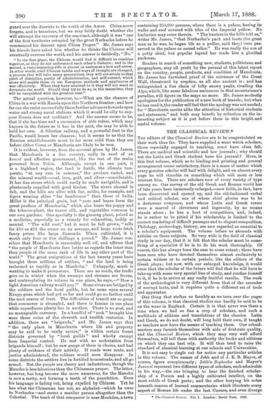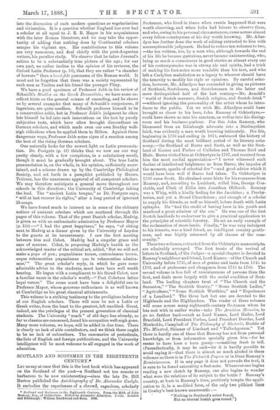THE CLASSICAL REVIEW.* 'Pia editors of the'Classical Review are to
be congratulated on their work thus far. They have supplied a want which scholars, those especially engaged in teaching, must have often felt. There are medical and scientific and law journals ; why should not the Latin and Greek student have his journal ? Here, in this first volume, which as to binding and printing and general arrangement seems satisfactory, there is a mass of matter which every genuine scholar will hail with delight, and on almost every page he will stumble on something which will more or less interest him. There are scholars now of every variety of type among us. Our survey of the old Greek and Roman world has of late years been immensely enlarged,—new fields, in fact, have been discovered and opened up, and the old-fashioned verbal and critical scholar, one of whose chief glories was to be a dexterous composer, and whose Latin and Greek verses were a marvel of cleverness and ingenuity, by no means stands alone ; he has a host of competitors, and, indeed, he is rather to be pitied if his scholarship is limited*to the correct rendering of difficult passages and to elegant composition. Philology, archEeology, history, are now regarded as essential to a scholar's equipment. The volume before us abounds with articles on these subjects. So very wide is the field of classical study in our day, that it is felt that the scholar must be some- thing of a specialist if he is to do his work thoroughly. Of course, this has always been the case to some extent; there have been men who have devoted themselves almost exclusively to certain writers or to certain periods, like the editors of the Greek plays ; but now, with our enlarged knowledge, it would seem that the scholar of the future will find that he will have to take up with some very special line of study, and confine himself to it, if he is to arrive at any really fruitful results. The work of the archwologist is very different from that of the emender of corrupt texts, and it requires quite a different set of tools and apparatus.
One thing that strikes us forcibly as we turn over the pages of this volume, is that classical studies can hardly be said to be on the wane in England. Certain it is that never was there a time when we had so fine a crop of scholars, and such a multitude of editions and translations of the classics. Latin and Greek, we do not doubt, will long hold their own, if taught as teachers now have the means of teaching them. Our school- masters may furnish themselves with aids of first-rate quality, and the Classical Iteview, which they may very well afford themselves, will tell them with authority the books and editions on which they can best rely. It will thus tend to raise the standard of classical learning at our schools and Universities.
It is not easy to single out for notice any particular articles in this volume. The names of Jobb and of J. E. B. Mayor, of course, figure conspicuously; Jebb'e Sophocles and Mayor's Juvenal represent two different types of scholars, each admirable in his way,—the one bringing to bear the finished scholar- ship of a Person and a highly cultivated intellect, on the most subtle of Greek poets; and the other burying his notes beneath masses of learned commentaries which illustrate every aspect of Roman life under the last Ca3sars, and even diverge
• The Classical Review. Vol. I. London: David Nutt. 1887. into the discussion of such modern questions as vegetarianism and vivisection. It is a question whether England has ever had a scholar at all equal to J. E. B. Mayor in his acquaintance with the later Roman literature, and we may take the oppor- tunity of adding that nothing done by Continental scholars escapes his vigilant eye. His contributions to this volume are very numerous, and deal chiefly with the post-Augustan writers, his peculiar study. We observe that he takes Juvenal's satires to be a substantially true picture of the age ; for our own part, we rather incline to the opinion of his reviewer, the Oxford Latin Professor (p. 16), that they are rather "a chamber of horrors" than a boncifide panorama of the Roman world. It must not be forgotten that there was a society represented by such men as Tacitus and his friend the younger Pliny.
We have a good specimen of Professor Jebb in his review of Schmidt's Studies on the Greek Dramatists; we have some ex- cellent hints on the general science of emending, and he shows us by several examples that many of Schmidt's conjectures, if ingenious, are quite needless. Schmidt professes himself to be a conservative critic, but in Professor Jebb's judgment he often lets himself be led into rash innovations on the text by purely subjective tests, which have often brought discomfiture on German scholars, and which made even our own Bentley well- nigh ridiculous when he applied them to Milton. Against these dangerous ways, Professor Jebb notes signs of a reaction among the beet of the rising German scholars.
One naturally looks for the newest light on Latin pronuncia- tion. Dr. Postgate (p. 41) thinks that we now see our way pretty clearly, with a few exceptions, to a satisfactory result, though it must be gradually brought about. The true Latin pronunciation is, on the whole, in his opinion, sufficiently ascer- tained, and a scheme drawn up by the Cambridge Philological Society, and set forth in a pamphlet published by Messrs. Triibner, has the unanimous approval of all competent scholars. We may therefore anticipate a general move throughout our schools in this direction ; the University of Cambridge taking the lead. The "ancient Latin tongue," as Dr. Postgate says, "will at last recover its rights," after a long period of ignorant ill-usage.
We have found much to interest us in some of the obituary notices of eminent scholars which are scattered through the pages of this volume. That of the great Danish scholar, Madvig, is given us with an enthusiastic admiration by Professor Mayor (p. 124) :—" I had the great happiness," he says, "of sitting next to Madvig at a dinner given by the University of Leyden to the guests at its tercentenary. I saw the first meeting between him and Cobet. Madvig had a singular grace and ease of manner. Cobet, in proposing Madvig's health as the acknowledged master of the critical art, added, 'But we will not make a pope of you ; pugnabimus tecum, contendemus tecum, eoque vehementius pugnabimus quo te vehementius admira- mar.' " The great scholar's reply, in which he gave some admirable advice to the students, must have been well worth hearing. He began with a compliment to his friend Cobet, now a familiar name in the scholar's world,—" Post Cobetum latine loqui vereor." The scene must have been a delightful one to Professor Mayor, whose generous enthusiasm is as well-known at Cambridge as his great classical attainments.
This volume is a striking testimony to the prodigious industry of our English scholars. There will soon be not a Latin or Greek writer, from the least to the greatest, left unedited. Great, indeed, are the privileges of the present generation of classical students. The University " coach " of old days has already, so far as classics are concerned, found his occupation well-nigh gone. Many more volumes, we hope, will be added in due time. There is clearly no lack of able contributors, and we think there ought to be no lack of subscribers. The summaries of periodicals, the lists of English and foreign publications, and the University intelligence will be most welcome to all engaged in the work of education.



































 Previous page
Previous page